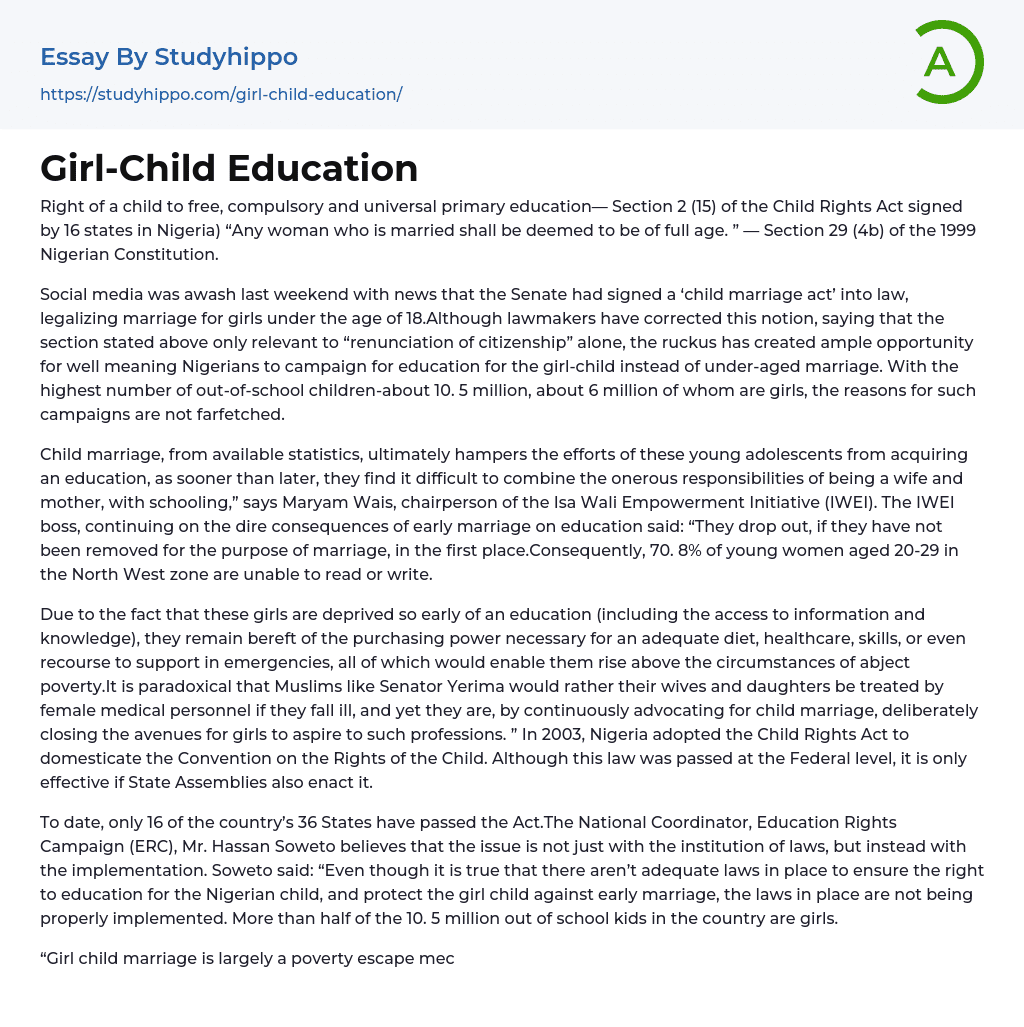Section 2 (15) of the Child Rights Act, which has been signed by 16 states in Nigeria, guarantees that every child is entitled to free, compulsory and universal primary education. Similarly, section 29 (4b) of the Nigerian Constitution of 1999 regards any woman who is married as being of full age.
Reports circulated on social media over the weekend that the Senate had approved a measure permitting marriage for girls under 18, leading to significant uproar. Nevertheless, lawmakers have explained that this provision only pertains to "renunciation of citizenship" and not marriage. Nonetheless, Nigerians are now calling for education initiatives aimed at young girls instead of child marriage as a result of this situation. Nigeria presently has over 10.5 million unschooled children, including about six million girls, making it vital to back these campaigns.
Maryam Wais, the Chairperson of the Isa Wali
...Empowerment Initiative (IWEI), emphasizes that child marriage adversely affects the education of young adolescents. Studies indicate that such girls find it challenging to manage their roles as wives and mothers alongside attending school, leading them to drop out early or leave for marriage. Consequently, 70.8% of women aged 20-29 in the North West zone lack literacy skills.
The lack of education for young girls results in limited access to knowledge and information, leading to insufficient purchasing power. The consequences are dire, as they cannot acquire essential needs like food or healthcare, nor support in emergencies. Shockingly, some Muslims, including Senator Yerima, endorse child marriage that prevents girls from pursuing professions such as medicine. However, they prefer female medical personnel when it comes to treating their wives and daughters. Although the Child Rights Act has been adopte
at a Federal level in Nigeria since 2003 based on the Convention on the Rights of the Child, its effectiveness relies heavily on State Assemblies' implementation.
The National Coordinator of Education Rights Campaign (ERC), Mr. Hassan Soweto, emphasizes that passing laws regarding the right to education in Nigeria is only effective in 16 out of 36 states, as it is not enough to enact laws alone. Soweto points out that equally important is enforcing these laws. Although there are insufficient regulations aimed at safeguarding Nigerian children's education and banning early marriage for girls, Soweto observes that current legislation is not being properly implemented. Consequently, more than half of the country's 10.5 million out-of-school children are female.
Financial difficulties within families in northern Nigeria are the primary reason for marrying young girls. This practice is often justified by religion, but it stems from parents' inability to support themselves and their children. Consequently, young girls are frequently married off. However, wealthier families tend not to engage in this phenomenon.
The education, health, and human rights of girls are threatened by early child marriage. To address this issue effectively, poverty elimination and appropriate infrastructure development are necessary. In Nigeria, the prevalence of child marriage is concerning with 20% of girls marrying before age 15; in the Northwest region alone, this figure jumps to an alarming 48%. Furthermore, among girls aged 15-19 who are in polygamous marriages, 27% become child brides without access to education. According to UNPFA data, only a mere 2% of married girls between ages 15-19 receive schooling compared to their unmarried peers (69%). Among married girls in particular, approximately73% have had no formal education as opposed
to only around8% among unmarried ones. Therefore, three out every four married girls remain illiterate.
Senator Ahmed Yerima, who served as a governor of Zamfara State and represents an unstable region in the Senate, has suggested that early marriage could potentially resolve 50% of Nigeria's various problems. Although there are allegations that Yerima himself married a 13-year-old girl from Egypt in 2009, it is uncertain whether his claim is accurate. Yet when considering the Millennium Development Goals (MDGs), it becomes apparent that early marriage does not correspond with resolving these issues. The MDGs target alleviating extreme poverty and hunger, promoting education, decreasing child mortality rates, improving maternal health, and fighting diseases - objectives which are unlikely to be accomplished through early marriage practices.
Wais explains that depriving children of both formal and non-formal education at a young age can result in restricted mobility, heightened domestic responsibilities, the denial of critical freedoms needed for survival, development, and participation, as well as missed opportunities during adolescence. Furthermore, when mothers lack education, their children are less likely to attain higher levels of schooling. This perpetuates low literacy rates and limited career prospects. Ultimately, child marriage negatively impacts communities by preventing girls from making intellectual and financial contributions that would benefit themselves and their future offspring. Consequently, this contributes to low ratings across all aspects of human endeavor particularly in the North.
- Academia essays
- Higher Education essays
- Language Learning essays
- Studying Business essays
- Education System essays
- Study essays
- First Day of School essays
- Scholarship essays
- Pedagogy essays
- Curriculum essays
- Coursework essays
- Studying Abroad essays
- Philosophy of Education essays
- Purpose of Education essays
- Brainstorming essays
- Educational Goals essays
- Importance Of College Education essays
- Brown V Board of Education essays
- The Importance Of Higher Education essays
- Online Education Vs Traditional Education essays
- Academic And Career Goals essays
- Academic Integrity essays
- Brown Vs Board Of Education essays
- Distance learning essays
- Technology in Education essays
- Vocabulary essays
- Writing Experience essays
- Importance of Education essays
- Early Childhood Education essays
- Academic Degree essays
- Academic Dishonesty essays
- School Uniform essays
- Academic writing essays
- Cheating essays
- Bachelor's Degree essays
- MBA essays
- College Life essays
- Grade essays
- Diploma essays
- Phonology essays
- Sentence essays
- Filipino Language essays
- Pragmatics essays
- Millennium Development Goals essays
- History Of Education essays
- Graduate School essays
- Middle School essays
- School essays
- Special Education essays
- University essays




